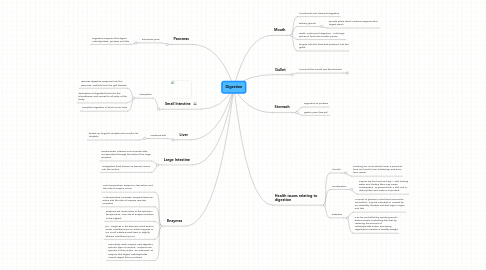
1. Pancreas
1.1. Pancreatic juice
1.1.1. Digestive enzymes that digest carbohydrates, proteins and fats
2. Small Intestine
2.1. Absorption
2.1.1. receives digestive enzymes from the pancreas, and bile from the gall bladder
2.1.2. absorption of digested food into the bloodstream and carried to all parts of the body
2.1.3. complete digestion of food occurs here
3. Liver
3.1. Produces bile
3.1.1. breaks up large fat droplets into smaller fat droplets
4. Large Intestine
4.1. excess water, vitamins and minerals salts are absorbed through the walls of the large intestine
4.2. Undigested food (known as faeces) moves into the rectum
5. Enzymes
5.1. Low temperature: Enzyme is less active and the rate of enzyme is low
5.2. As temperature increases, enzymes become active and the rate of enzyme reaction increases
5.3. Enzymes are most active at the optimum temperature. The rate of enzyme reaction is the highest.
5.4. pH - enzymes in the stomach work best in acidic conditions (pH 2), while enzymes in our small intestine work best in slightly alkaline conditions (pH 8).
5.5. Specificity: Each enzyme only digests a specific type of nutrient - enzymes are specific in their action. For example, an enzyme that digest carbohydrates cannot digest fats or proteins.
6. Mouth
6.1. Mechanical and chemical digestion
6.2. salivary glands
6.2.1. secrete saliva which contains enzymes that digest starch
6.3. Teeth: mechanical digestion - cuts large pieces of food into smaller pieces
6.4. tongue rolls the food and pushes it into the gullet
7. Gullet
7.1. connects the mouth and the stomach
7.1.1. peristalsis
8. Stomach
8.1. Digestion of proteins
8.2. gastric juice (low pH)
9. Health issues relating to digestion
9.1. Alcohol
9.1.1. Drinking too much alcohol over a period of time can lead to liver hardening, and even liver cancer
9.2. Constipation
9.2.1. Faeces are too hard and dry. A diet lacking water and dietary fibre may cause constipation. To prevent this, a diet rich in dietary fibre and water is important.
9.3. Diabetes
9.3.1. Amount of glucose in the blood cannot be controlled - may be inherited or caused by an unhealthy lifestyle and diet high in sugar and fats
9.3.2. Can be controlled by injecting insulin before meals; controlling the diet by reducing the amount of carbohydrates eaten; exercising regularly to maintain a healthy weight

